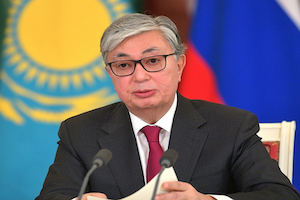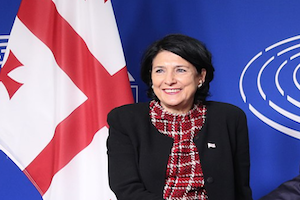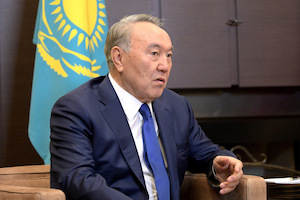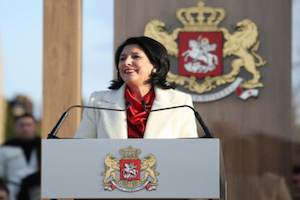Georgia’s October 26th Parliamentary Election: What’s at stake and what do we expect?
By Pauline Le Grand
This Saturday, on October 26th, Georgia, will decide its future trajectory in parliamentary elections. The country stands at a crossroads and must decide whether to continue towards a European future or turn towards authoritarianism. After achieving candidate status for the European Union in 2023, the passing of the “foreign agent” law by the ruling Georgian Dream (GD) party raised concerns over the country’s democratic progression and stalled its EU ascension. The GD remains a strong contender for this election, especially in Georgia’s more conservative regions, and risks steering Georgia away from the EU for good. This election will not only test the resilience of Georgia’s democratic institutions but will also reveal the country’s broader geopolitical alignment in an increasingly polarized region.

BACKGROUND: On October 26th, Georgians will head to the polls to decide their future. This election is one of the most significant in Georgia's history as it will determine whether Georgia will remain on its European path or succumb to the Kremlin's sphere of influence. In December 2023, Georgia was granted candidate status for the European Union on the understanding that the country would work to make significant changes towards accession. Yet, since then, Georgia appears to have done just the opposite and its accession process has been frozen. In April 2024, the current government, led by the Georgian Dream (GD) party, passed the law on transparency of foreign influence, referred to as a copy-paste of Russia's foreign agent law. Civil society organizations (CSOs) receiving more than 20 percent of funds from overseas had to register on the Government's list as they were deemed to be carrying out the interests of a foreign power. The bill was first proposed in 2023 but withdrawn due to popular discontent. This year, despite promising to not revisit the law, despite even fiercer popular opposition gathering thousands of Tbilisi citizens in front of Parliament for weeks, and despite pro-European President Salome Zurabishvili's veto, the government adopted the bill on May 28th. Of an estimated 300,000 CSOs in Georgia, only 476 CSOs registered, with the others ignoring the law in protest. They preferred to wait for the government's investigation and resulting hefty fines with the hope that the upcoming election will lead to a reevaluation of the bill. The government also passed an anti-LGBTQ+ propaganda law in September as part of a legislative package 'On Protection of Family Values and Minors'. The law is a clear violation of freedom of expression and assembly. The Georgian Dream party has promised that if re-elected, it will effectively ban all opposition groups and turn Georgia into a single-party state. The GD, backed by billionaire Bidzina Ivanishvili, has been in power for the last twelve years and is determined to maintain its hold of the government. Despite the GD's apparent authoritarian turn and seeming unpopularity, it is projected to obtain a significant percentage of the vote. The question is whether it will secure enough votes for a supermajority, which would enable it to amend the constitution freely, distancing Georgia further from democracy and ultimately from the European Union.
IMPLICATIONS: In early October, the Georgian Dream launched an incredibly successful poster campaign across the country. While the capital of Georgia is relatively progressive and anti-GD, 70 percent of voters are registered outside the capital. Regional voters are overall less critical of the current government, focused on issues of employment and wages, stability and peace, and are generally culturally conservative. Regional voters have higher turnout and are therefore key to the outcome of the election and to Georgian Dream's constitutional super-majority (3/4 of Parliament).
The Georgian Dream (GD) party's rise to power was viewed by some as a positive turning point for Georgia. The party successfully ousted former President Mikheil Saakashvili, who had come to power following the 2003 Rose Revolution. Initially, Saakashvili's leadership brought significant improvements, including the removal of a corrupt elite, implementation of free-market reforms, and impressive economic growth. However, towards the end of his tenure, Saakashvili and his United National Movement (UNM) party tightened control over the political system, allowed elite corruption to spread, and expanded law enforcement powers excessively. Many felt that Saakashvili and the UNM had implemented changes too rapidly and aggressively. In contrast, GD's early years saw improvements in human rights and media freedom, along with a reduction in heavy-handed law enforcement. The party continues to benefit from lingering discontent with the Saakashvili era and fear of its potential return. GD has also cultivated support through social welfare programs, particularly pensions. Many voters worry these benefits might disappear if they don't support the ruling party. This fear is particularly pronounced in areas where electronic voting is being introduced, as some voters believe the new system compromises ballot secrecy, leading to pressure to vote for GD.
Fear remains a central and effective theme in Georgian Dream's (GD) election strategy. The mere possibility of losing pensions is often enough to drive voters to support GD. Similarly, the prospect of the United National Movement's (UNM) return motivates some Georgians to cast their ballots this Saturday. The UNM is inextricably linked to memories and fears of war.
Under Saakashvili's leadership in 2008, Russia invaded South Ossetia, a territory beginning just 40 kilometers from the capital. The 1992-1993 war with Abkhazia also lingers in the collective Georgian memory. Russia's 2022 invasion of Ukraine reignited these concerns for Georgians, who strongly support Ukraine. The fear of another conflict weighs heavily on the minds of Georgians, particularly older voters who constitute the majority of the electorate – a fear GD has not hesitated to exploit.
A week after its initial poster campaign, GD launched a new series depicting Ukrainian buildings destroyed by Russian bombs alongside intact Georgian structures. This campaign sparked online outrage, with Georgian President Salome Zurabishvili commenting on Facebook: "How desperate and pitiful must you be to shamelessly and brazenly offer your people a poster crafted in the 'forges of the KGB'! 'With dignity' towards hell!" Nevertheless, GD's message remains potent; they warn that a vote for the opposition is a vote for war. Ivanishvili even suggested apologizing to South Ossetia for the 2008 war, which he blamed on Saakashvili's government. GD also hints at the possibility of reconciliation between Georgia, Abkhazia, and South Ossetia with Russian assistance.
GD's successful fear campaigns stand in stark contrast to the opposition's apparent weaknesses. No single party emerges as particularly strong. Fragmented across four different coalitions, none offers a promising alternative. The opposition lacks connection with the regions; once outside Tbilisi, the already scarce opposition campaign posters virtually disappear. In some areas, voters have never even heard of certain opposition parties. Even in Tbilisi, those inclined to vote against GD struggle to choose a party, uncertain which might garner more votes.
CONCLUSION: This weekend's election will undoubtedly be a pivotal moment for Georgia's foreign policy orientation and liberal democracy, both within Georgia and more broadly. With a high risk of external interference, particularly from Russia, the stakes are high. Moldova's close call last weekend in the EU referendum serves as a reminder of the fragility of democracy and regional tendencies towards illiberalism. Still, the hope remains that Georgia's path will continue to align with Europe and the West, reflecting the population's overwhelming desire to join the European Union. Georgia is caught between an older population that remembers with great fear these two wars and is willing to back down to Russia and a politically active younger population who dreams of a liberal and European future. October 26th will show the rest of the world which pull is stronger today in Georgia.
AUTHOR'S BIO: Pauline Le Grand is a research intern at the Rondeli Foundation in Tbilisi, Georgia, where she researches Russia's influence in Ukraine, Central Asia and the Caucasus.
Kazakhstan Elects New President
By Natalia Konarzewska
June 18, 2019, the CACI Analyst
On June 9, 2019, Kazakhstan held snap presidential elections following the resignation of long-term President Nursultan Nazarbayev. Nazarbayev’s close associate and former speaker of the Senate Kassym-Jomart Tokayev won the ballot receiving 70.76 percent of the votes. The election was accompanied by large protests in the country’s capital Nur-Sultan and in Almaty, followed by detentions of hundreds of protesters. It is unlikely that the change of president will bring radical change in Kazakhstan. Tokayev has already declared his commitment to preserving Nazarbayev’s legacy. Multiple developments indicate that preparations for the power shift in Kazakhstan have been ongoing for years, suggesting that the presidential succession was carefully planned and micromanaged from behind the scenes to ensure a smooth transition of power.

Georgian Politics in Anticipation of the 2020 Parliamentary
By Casper Wuite
May 28, 2019, the CACI Analyst
Only six months after a closely fought presidential election, Georgia’s political forces are repositioning themselves for the 2020 parliamentary elections. With Georgian Dream’s popularity waning – the party won landslides in previous votes – the party may need support from conservative and ultra-nationalist political parties in order to form a majority government after 2020. The international community, concerned about the rise of pro-Russian and nationalist sentiment, will keenly watch the 2020 elections to see in which direction the country, and its process of democratization and Euro-Atlantic and European Integration, is heading.

Why Kazakhstan's Presidential Elections Matter
By Rafis Abazov
May 23, 2019, the CACI Analyst
The resignation of Kazakhstan’s President Nursultan Nazarbayev in spring 2019, after 30 years of uninterrupted stewardship, had an unexpected timing. However, even more unexpected was the Parliament of Kazakhstan’s hastily announced early presidential elections scheduled for June 9, 2019. Even some major political insiders were caught unprepared. Indeed, leading local analyst Sergei Domnin of Expert Magazine wrote that the entire political establishment woke up to find Kazakhstan at a political “crossroad.” Some believe that the elections are just a face change and that the ruling elite will continue to pursue the same policies. Others claim that the elections could lead to the emergence of an “entirely new political model.”

Georgia's Last Direct Presidential Elections
By Natalia Konarzewska
January 16, 2019, the CACI Analyst
On November 28, 2018, Georgians elected their next president in the second round, in the last direct presidential elections before the country fully switches to a parliamentary system. Salome Zurabishvili, an independent candidate endorsed by the ruling Georgian Dream (GD) party, won the election by securing 59 percent of the vote against opponent Grigol Vashadze from United National Movement (UNM) who received 40 percent. Zurabishvili received the largest number of votes in the first election round on October 28 but did not reach the 50 percent threshold needed to win. Observers assessed that elections were largely competitive but not fair. Some irregularities and incidents occurred during the voting, however, they did not seriously affect the outcome.



